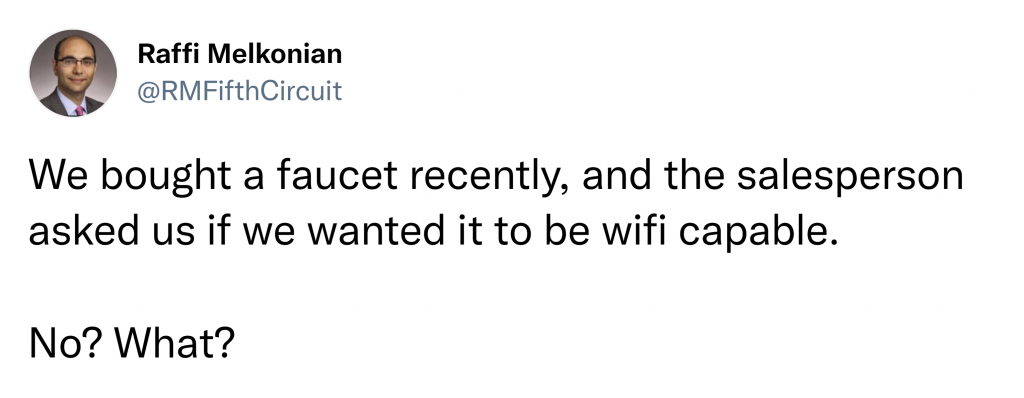1. Good Monday Morning
It’s March 28th. This is your special reminder that Thursday is April Fools’ Day. There will be plenty of online shenanigans. Those originating in Oz or APAC countries will reach US users on March 31st. Be a little judicious regarding what you see online midweek.
Today’s Spotlight is 1,358 words — about a 5 minute read.
2. News To Know Now
Quoted: “The Oxford English Dictionary accepts both pronunciations. They are wrong. It is a soft ‘G,’ pronounced ‘jif.’ End of story.”— GIF creator Stephen Wilhite to The New York Times in 2013. Wilhite died last week at the age of 71, but not before fulfilling this word nerd’s fantasy of correcting the OED.
a) Graphics chip company NVIDIA announced last week that it has developed software that can render a 3D scene from a series of 2D photographs in nearly real-time.
b) A data privacy agreement between the U.S. and E.U. will allow American data centers to handle operations in Europe. Stringent data privacy laws there created asymmetry among different divisions in many organizations, especially after the EU’s Court of Justice ruled twice in five years that American laws were insufficient to protect European citizens’ rights. The deal was announced Friday and is still preliminary.
c) Facebook moderation seems to be undergoing some changes. In the last few days we’ve heard from two capable social media posters that they received account restrictions based on memes or sarcastic posts they made two years ago regarding the Trump administration’s handling of COVID-19. Facebook rolled out some new automated tools for group moderation just two weeks ago, which may explain part of the delayed response. Algorithms have a nearly impossible time detecting sarcasm, but there is also a tough toll on human moderators, nearly all of whom are classified as non-employee contractors.
Also last week, attorneys for two former TikTok content moderators announced a class-action suit against that social media network for being required to moderate videos of extreme violence, pornography, and child abuse. Facebook settled a similar suit last year for $85 million. Meanwhile, moderation often remains heavy-handed because of its reliance on automation.
3. Search Engine News — Even The Inside Folks Ask Each Other
It’s not just those of us outside Google.
Earlier this month, former Google Search executive Malte Ubl announced his departure from the company after 11 years. Just days later he was publicly asking for help or documentation about a Google search index practice. Kudos to Search Engine Roundtable for spotting the tweet. Everyone involved in search needs reference materials, notes, and the ability to strategize. No one memorizes it all.
We also got confirmation last week that Google uses “alt text” on images for image search. And while that very important field is not used for non-image search, it is used by millions of visually impaired people whose assistive devices rely on a website’s written description of the image.
4. Spotlight Explainer — Health Technology Breakthroughs
There have been so many health technology breakthroughs announced in the last month that rounding them up for you fills a whole explainer. Even better: some of them have jumped from tech and science journal coverage to mainstream media, especially the exciting brain-computer interface.
Brain-Computer Interfaces
We last wrote about Neuralink 10 months ago. We were excited then about the opportunity for an interface that could decode signals in the brain related to creating letters to communicate. That project’s researchers insisted at the time that their system was not even close to a prototype.
That’s why it was thrilling last week to learn that a team in Europe has published a journal article on this topic citing experiments with a “locked-in” patient who suffered from amyotrophic lateral sclerosis (aka ALS or Lou Gehrig’s disease). There are plenty of questions and vetting left to happen, but it’s a marvel.
Fabric That Monitors Your Heartbeat
A team from MIT & The Rhode Island School of Design has created fabric that amplifies the imperceptible motion of mechanical vibrations made by sound … like a heartbeat. Those vibrations are then converted to an electric signal that can monitor respiration and heart activity. There are plenty of non-health applications for this technology, but there are also more than 100 million Americans who suffer from heart or lung disease who could benefit from convenient, non-invasive regular monitoring.
While AI Diagnoses Heart Disease In 20 Seconds
The British National Health Service has launched a new AI tool that detects heart disease for patients in an MRI scanner within 20 seconds. A health technology journal reported that a similar diagnosis from a physician averaged 13 minutes. The NHS says that the tool is being used for 140 patients per week in London now and will roll out to 40 more locations.
Face2Gene App Now Diagnoses 1,000 Conditions
Another health technology visualization tool called Face2Gene launched years ago has now tripled the number of conditions it can detect. The algorithm can also reportedly adjust for different ethnic backgrounds between patients. There are more than 7,000 rare diseases (sometimes known as orphan diseases) according to the NIH.
5. Did That Really Happen? — A VA Tech Swimmer Did Not Tweet About Trans Athletes
Faking a tweet is child’s play. There are multiple free fake tweet generators available online. A new fake image accusing a transgender college swimmer of “stealing a competitive slot” was attributed to a Virginia Tech swimmer who never made the post.
The AP details the false statement that was shared more than 28,000 times.
6. Following Up — Ukraine Using Clearview AI Facial Recognition
We’ve written about Clearview AI and the way that they improperly downloaded facial recognition data from many of the world’s largest social media networks. Now Reuters is reporting that the Ukrainian military is imaging the faces of dead Russian soldiers and contacting their families about their loved ones death.
Tread lightly around this issue because many false positives are possible, to say nothing of the propaganda value of a country fighting for its life giving these stories wide play. Could there be a better way to win the hearts and minds of your enemy’s citizens? This could be happening and would be interesting if it did happen, but it’s impossible to know for certain.
7. Protip — How To Reopen Closed Tabs in Chrome’s Browser
Not so fast. We mean how to reopen those tabs if your browser crashed and there is no “reopen last session” or “reopen closed tab” option. You, my friend, need to learn about the Chrome browser’s History function.
8. Screening Room — Behr Says Its Time For A Makeover
9. Science Fiction World — Broadband On The Moon
To hear Aquarian Space talk about the issue, there would not just be broadband on Earth’s moon, but between the Earth and moon. The company says that the 13 landers, orbiters, and rovers on and around the moon are projected to grow to 200 vehicles over the next 8 years. You are not alone if you just thought about a streaming movie buffering on your television.
10. Coffee Break — Politician Short Attention Span
You may have noticed plenty of distracted U.S. senators during last week’s televised hearings. Belgian politicians are also on a daily livestream.
Dries Depoorter wrote software that monitors that livestream to search for politicians using their phone when they should be paying attention to the proceedings. The software then captures the image, uses facial recognition to identify the politician, and then posts the image to Twitter and Instagram with the politician tagged.
Have I mentioned yet how much I adore this? Have a look for yourself.
11. Sign of the Times

